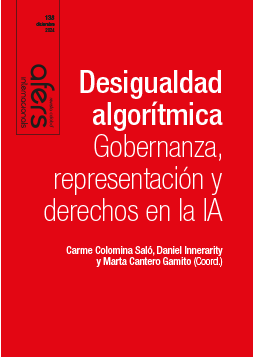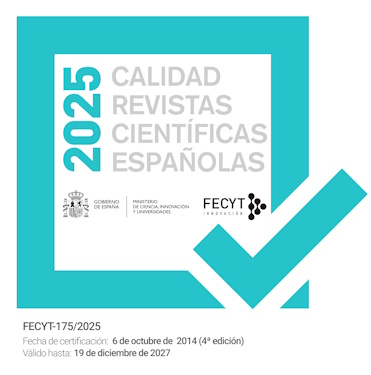Defensa y crítica de la gobernanza algorítmica
Paraules clau:
democracia, gobernanza algorítmica, inteligencia artificial (IA), decisión política, burocraciaResum
Revista CIDOB d’Afers Internacionals, nº 138, pp. 11-25
Cuatrimestral (octubre-diciembre 2024)
ISSN:1133-6595 | E-ISSN:2013-035X
DOI: https://doi.org/10.24241/rcai.2024.138.3.11
El problema de la relación entre gobernanza algorítmica y democracia representa una continuidad y, al mismo tiempo, una ruptura con las clásicas formas de administración burocrática. Para entender su compatibilidad con los valores democráticos, hay que examinar el alcance de las expectativas que suscita, básicamente en cuanto a proporcionar más objetividad a las decisiones políticas y adoptarlas con una mayor consideración de nuestra subjetividad como ciudadanos destinatarios de tales decisiones. Los límites de estas promesas nos obligan a concluir en la inevitabilidad de la decisión humana, de la política en cualquier entorno tecnológico, incluido el configurado por las nuevas formas de gobernanza algorítmica.
Referències
Adorno, Theodor W. y Horkheimer, Max. Dialektik der Aufklärung, Berlin: Fischer, 1988.
Aneesh, Aneesh. «Global Labor: Algocratic Modes of Organization». Sociological Theory, vol. 27, n.º 4 (2009), p. 347-370.
Chen, Min; Mao, Shiwen y Liu, Yunhao. «Big Data. A Survey». Mobile Networks and Applications, vol. 19, (2014), p. 171-209.
Citron, Danielle Keats. «Technological Due Process». Washington University Law Review, vol. 85, n.º 6 (2007), p. 1.249-1.313.
Danaher, John. «The threat of algocracy: Reality, resistance and accommodation». Philosophy & Technology, vol. 29, (2016), 245-268.
Daston, Lorraine y Galison, Peter. Objectivity. Nueva Jersey: Princeton University Press, 2010.
Duberry, Jérôme. Artificial Intelligence and Democracy. Risks and Promises of AI-Mediated Citizen–Government. Cheltenham: Elgar, 2022.
Gillespie, Tarleton. «The Relevance of Algorithms», en: Gillespie, Tarleton; Boczkowski, Pablo J. y Foot, Kirsten A. (eds.) Media Technologies: Essays on Communication, Materiality, and Society. Cambridge, MA.: The MIT Press, 2014, p. 167-193.
Gillespie, Tarleton. «Algorithm», en: Peters, Benjamin (ed.) Digital Keywords: A Vocabulary of Information Society and Culture. Nueva Jersey: Princeton University Press, 2016, p. 18-30.
Hildebrandt, Mireille. «Law as Information in the Era of Data-Driven Agency: Law as Information». The Modern Law Review, vol. 79 , n.º 1 (2016), p. 1-30.
Innerarity, Daniel. Una teoría de la democracia compleja. Gobernar en el siglo XXI, Galaxia-Gutenberg: Barcelona, 2020.
Just, Natascha y Latzer, Michael. «Governance by Algorithms: Reality Construction by Algorithmic Selection on the Internet». Media, Culture & Society, vol. 39, n.º 2 (2017), p. 238-258.
König, Pascal. «Algorithmen und die Verwaltung sozialer Komplexität. Zur Neukonfigurierung der Idee der Selbstregierung des Volkes». Zeitschrift für Politikwissenschaft, vol. 28, (2018), p. 289-312.
König, Pascal y Wenzelburger, Georg. «Between technochauvinism and human-centrism: Can algorithms improve decision-making in democratic politics?». European Political Science, vol. 21, (2021), p. 132-149.
Krüger, Julia y Lischka, Konrad. «Was zu tun ist, damit Maschinen den Menschen dienen», en: Mohabbat Kar, Resa; Thapa, Basanta y Parycek, Peter (eds.) (Un)berechenbar? Algorithmen und Automatisierung in Staat und Gesellschaft. Berlin: Fraunhofer-Institut für Offene Kommunikationssysteme FOKUS, 2018, p. 440-470.
Lash, Scott. «Power after hegemony». Theory, Culture & Society, vol. 24, n.º 3 (2007), p. 55-78.
Lee, Min Kyung; Kusbit, Daniel; Metsky, Evan y Dabbish, Laura. «Working with Machines: The Impact of Algorithmic and Data-Driven Management on Human Workers», en: Begole, Bo y Kim, Jinwoo (eds.) Proceedings of the 33rd Annual ACM Conference on Human Factors in Computing Systems. Nueva York: ACM, 2015, p. 1.603-1.612.
Lessing, Lawrence. Code and other Laws of Cyberspace. Nueva York: Basic Books, 1999.
Lindblom, Charles. The Intelligence of Democracy: Decision Making Through Mutual Adjustment. Nueva York: The Free Press, 1965.
Mager, Astrid. «Algorithmic Ideology: How Capitalist Society Shapes Search Engines». Information, Communication & Society, vol. 15, n.º 5 (2012), p. 769-787.
Martini, Mario y Nink, David. «Wenn Maschinen entscheiden». Neue Zeitschrift für Verwaltungsrecht, n.º 10 (2017), 1-14.
Misuraca, Gianluca y Van Noordt, Colin. «AI Watch – artificial intelligence in public services: Overview of the use and impact of AI in public services in the EU». Publications Office of the European Union, JRC Working Papers (JRC120399) (2 de julio de 2020) (en línea) https://publications.jrc.ec.europa.eu/repository/handle/JRC120399
Neumann, John von. Theory of Self-Reproducing Automata. Urbana: University of Illinois Press, 1966.
Nunes, Mark. Error: Glitch, Noise, and Jam in New Media Culture. Nueva York: Continuum, 2011.
O’Reilly, Tim. «Government as a Platform». Innovations: Technology, Governance, Globalization, vol. 6, n.º 1 (2011), p. 13-40.
Pasquale, Frank. The Black Box Society: The Secret Algorithms that Control Money and Information. Cambridge, MA: Harvard University Press, 2015.
Peeters, Rik y Widlak, Arjan. «The digital cage: Administrative exclusion through information architecture – The case of the Dutch civil registry’s master data management». Government Information Quarterly, vol. 35, n.º 2 (2018), 175-183.
Porter, Theodore. Trust in numbers: The pursuit of objectivity in science and public life. Nueva Jersey: Princeton University Press, 1995.
Rouvroy, Antoinette. «The end(s) of critique: data-behaviourism vs. due process», en: Hildebrandt, Mireille y de Vries, Katja (eds.) Privacy, Due Process and the Computational Turn. Philosophers of Law Meet Philosophers of Technology. Nueva York: Routledge, 2013, p. 143-167.
Rouvroy, Antoinette. «Algorithmic Governmentality and the Death of Politics». Society, Media and Culture, (20 de marzo de 2020) (en línea) https://www.greeneuropeanjournal.eu/algorithmic-governmentality-and-the-death-of-politics/
Sandvig, Christian. «Seeing the sort: The aesthetic and industrial defense of ‘the algorithm’». Journal of the New Media Caucus, vol. 10, n.º 3 (2015), p. 1-21.
Suchman, Lucy. Human-Machine Reconfigurations: Plans and Situated Actions. Cambridge: Cambridge University Press, 2007.
Urbinati, Nadia. Democracy disfigured: opinion, truth, and the people. Cambridge, MA.: Harvard University Press, 2014.
Weizenbaum, Joseph. Computer Power and Human Reason. San Francisco: Freeman, 1976.
Wouters, Niels; Kelly, Ryan; Velloso, Eduardo; Wolf, Katrin; Shahid Ferdous, Hasan; Newn, Joshua; Joukhadar, Zaher y Vetere, Frank. «Biometric Mirror: Exploring Values and Attitudes towards Facial Analysis and Automated Decision-Making». Association for Computing Machinery, Proceedings of the 2019 Designing Interactive Systems Conference, Nueva York, (23-28 de junio de 2019), p. 447-461.
Yeung, Karen. «Algorithmic Regulation: A Critical Interrogation». Regulation & Governance, vol. 12, n.º 6 (2017), p. 1-19.
Zarsky, Tal. «The trouble with algorithmic decisions: An analytic road map to examine effciency and fairness in automated and opaque decision making». Science, Technology and Human Values, vol. 41, n.º 1 (2016), p. 118-132.













